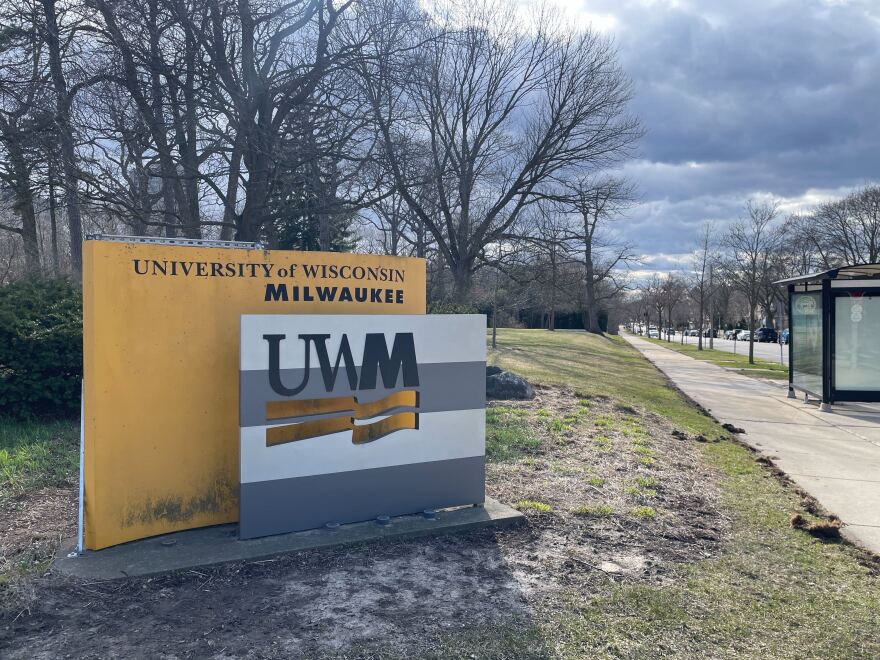Harvard and Columbia Universities are dominating the headlines right now regarding uncertainty for international students. The Trump administration has cracked down on student protestors and challenges Harvard’s ability to admit students from overseas.
But smaller colleges in Wisconsin are starting to feel the full impact of student visa revocations, news of ICE raids and general unease about studying in the United States.
At a panel discussion June 9, University if Wisconsin- Milwaukee Chancellor Mark Mone said that UWM expects 400 to 500 fewer international students to enroll next school year.
The university usually has between 1,300 and 1,900 international students each year. They come to the U.S. from countries like India, China and South Korea.
“We expect more than a third of our international student enrollment to decline this fall, and potentially more," he says. "That’s actually one of our better case scenarios. So that puts that in the scale and context.”
More than a dozen UWM student and recent graduates’ visas were revoked by the State Department this spring with little to no explanation. Those revocations were reversed.

Elsewhere, the Trump administration has said it’s revoking the visas of students who participated in protests over the war in Gaza.
All this uncertainty is like poison to international interest in American universities.
William Brustein, a global strategist for international higher education and professor emeritus at West Virginia University and the University of Pittsburgh, explains why.
“There’s this anxiety, this concern, this fear, that they will come over here and they would be so concerned about every little word they said, the steps they took, the groups they joined, who they involved themselves with," he says. "It’s just an unknown what’s going to happen next week or two weeks or within a year.”
Those factors will affect the Ivy League, sure. But state schools in the Midwest have a lot to lose, too.
In Wisconsin, international students contributed $541 million to the state’s economy in 2023. That’s according to data from the Institute of International Education’s Open Doors project.
That money doesn’t just come in through tuition, Brustein says.
“Particularly we’re talking about smaller towns, where they help the local economy thrive. Whether they’re renting out accommodations, they’re buying food and other supplies, they may be purchasing an automobile," he says. "In many ways, that’s going to have an impact on the local economy.”
While international enrollment wavers, U.S. high school students wonder whether college is worth it
But colleges aren’t just facing decreased enrollment from overseas. It’s happening here at home, too.
John Swallow is president of Carthage College, a private institution in Kenosha. He says colleges across the country are already facing a looming enrollment cliff due to the falling birth rate and concerns about the cost of college.
“There will be fewer and fewer high school graduates in Wisconsin and the Midwest for years to come. Fifteen percent fewer high school graduates in Wisconsin 15 years from now," he says. "So you can imagine what that does to the industry. There will be downward pressure on net tuition for years to come. The question a lot of us are wrestling with is, ‘How does higher education stay afloat?’”
To answer that, he says Carthage is focused on cost. The college lowered tuition by 30% in 2019 to try to attract more students. New initiatives cap the out-of-pocket cost for families earning lower incomes, and limit the prices of books to $200 per student.
Cindy Gnadinger is president of Carroll University, a private institution in Waukesha known for its health sciences programs. She says Carroll saw the largest number of international students in the university’s history last school year at nearly 100.
While that’s up in the air for next year, Gnadinger says Carroll is focusing on recruiting domestic students to soften the blow of enrollment declines.
That’s required some strategy. As Gnadinger explains, Carroll targets students in Arizona for two specific reasons.
“A lot of our alums retire in Arizona, and we know that it’s a single flight from Phoenix to Milwaukee. We also happen to be a small, division three institution ... There are no division three athletics in Arizona. So if you’re a young person in high school and you love your sport and you want to continue playing and you’re not good enough to play (division) one, you have to leave the state. And so we thought, 'Why not encourage them to come to our area?'”
Colleges need to think 'boldly' to serve new populations, smaller generation of students
Brustein, the international education strategist, says the combination of falling international interest and lower domestic student enrollment will require colleges to get creative with who they serve.
“It’s not the only population out there, the 18-to-22 year olds," he says. "Let’s start thinking if what they can do more with respect more to people who are in their careers. Working with the local community, working with businesses in the area to help people re-skill.”
As colleges settle into summer, students both foreign and domestic will seriously consider their plans for the fall.
For students abroad, they’ll need to decide whether college in the U.S. is worth the uncertainty and the cost.
Students stateside may be wondering the same thing.
Are you an international student considering your options for the fall? Contact WUWM education reporter Katherine Kokal at (414) 251-9363 or at kokal@uwm.edu to share your experience.
WUWM is a service of UW-Milwaukee.






